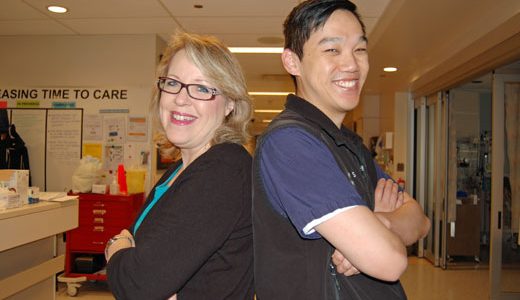New code stroke RNs are there in a heartbeat
“I believe we’re on the leading edge of something really special,” says Marjorie Ratel.
Marjorie, a high acuity nurse with Neurosciences, is referring to the addition of code stroke response nurses (RNs) to the VGH Stroke Program. The initiative is the first of its kind in BC and it’s showing great promise.
“Our aim is to reduce the time to treatment when every minute counts,” says Eilidh Strecha, who’s led much of the work behind the scenes. The patient care coordinator collaborated with nursing educators and others for more than a year to establish the service and improve outcomes for the more than 500 stroke victims admitted to VGH every year.
At the ready
Launched in March, the service boasts almost 20 code stroke RNs and one works on every Neurosciences Intensive Care Unit (NICU) shift. With no assigned patients, a code stroke RN is ready on a moment’s notice for an incoming stroke patient.
When the hospital learns that a stroke patient is on the way, the code stroke RN and physician on call have one and only priority: go to the Emergency Department (ED) to receive, assess and treat the patient without delay.
For the majority suffering an ischemic stroke, the goal is to set a new standard for treatment. Currently, the standard for administering tPA, a protein that breaks down blood clots, is 40 minutes. With the help of our code stroke RNs, we aim to administer this treatment in a record 30 minutes. Time saved could mean the difference between returning home within days or spending prolonged periods of time in hospital and rehabilitation — or worse.
“When it comes to strokes, it’s all about time,” says Dr. Philip Teal, clinical director, VGH Stroke Program. “Having highly skilled NICU nurses mobile enough to respond to acute strokes and bridge the transition from the Emergency Department to ICU will mean great advances for our program.”
Future of stroke care
NICU nurse Jeffrey Seto has been part of the code stroke RN team since its February pilot.
“I was interested in participating because it allows me to grow my practice and be exposed to new environments including the ED and Interventional Radiology. It’s good to be part of something that increases the continuity of care for patients and families.”
Code stroke RNs remain with patients, accompanying them on every step of their journey to the NICU and serving as a liaison between patients and families and other health care providers
“If I had a stroke, I’d want this service,” says Marjorie. “This is transformative work; the benefits are dramatic and instantaneous. I’m very enthusiastic about what VGH stroke specialists are doing and I’m excited about the future of stroke care.”
Act FAST for inpatient service
If you have a VGH inpatient displaying the FAST early warning signs of a stroke, don’t delay. A code stroke RN is available 24/7.
Call: 604 369-9244.
Related story
“They became my extended family”


Judy Buttress
This is a wonderful advance in the care of these patients. Kudos to all.